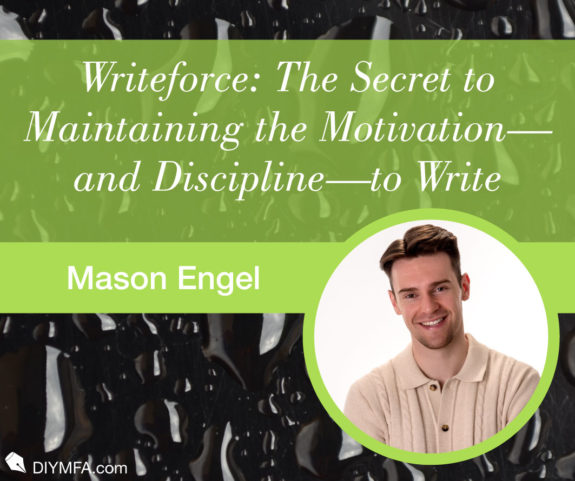What’s the most important quality in a writer?
Joyce Carol Oates has a surprising opinion. The most important writerly quality, she says, is not the ability to develop characters or structure plots. It’s not the presence of voice or the ear for flowing prose.
It’s energy.
But maybe that’s not a surprising opinion after all. As a writer, you’ve probably finished a writing session and felt physically and mentally drained. Or you’ve gotten home from a long day of work or study and you’ve lain on the couch, unable to muster the *energy* you need to write.
“It takes a lot of energy to be creative.” – Austin Kleon, in Steal Like An Artist
“It takes great passion and great energy to do anything creative.” – Agnes De Mille, legendary American dancer and choreographer.
At ClimbWrite, we call this energy “writeforce.”
Writeforce is a fact of the craft. Whether you believe it comes from God or the muse or creative discipline, you can’t deny that some kind of energy fuels your writing. This fuel is vitally important, but few of us give it the attention it deserves. We focus instead on things like dialogue and “show, don’t tell” and killer opening pages. These are all important components of the craft, to be sure, but it doesn’t matter how many great things we load into the car if we don’t have gas in the tank.
That’s where writeforce comes in.
It’s every great writer’s accelerant, the amplifier of skill, and the ticket to your writerly dreams.
So … what exactly is it? Where does it come from? And how can you use it to take your writing from good to great?
Writeforce Component #1: Purpose
Have you ever been unmotivated to do a task at work or at home? You’re midway through brushing the grout or reorganizing a filing cabinet, and you say to yourself: “I don’t even know why I’m doing this.”
Being disconnected from your purpose is debilitating for your enthusiasm. So if you find yourself dragging your feet before a writing session, it might be time to check in with your purpose. Why do you write? What are you trying to achieve–either for yourself or for others–and why is that thing worthwhile?
Even if you’re already writing with gusto, knowing the answers to these questions can accelerate your productivity and your enjoyment.
How strong is your purpose? Take the free Writeforce Assessment below, see if you’re better or worse than average, and use your results to start improving your score … and your chances of reaching your writerly goals.
Writeforce Component #2: Self-Acceptance
Say you have to run a marathon. (Sorry ;D ) Would you rather run it in 10-pound (or dollar) trainers? Or in Nike Free Runs?
Same question goes for your writing. Would you rather write a novel from a place of self-doubt and self-criticism? Or from a place of confidence and excitement?
Self-Acceptance allows you to take off the lead-lined tennis shoes, to silence the critical voice in your mind, and write freely. It allows you not only to find your writerly identity–your voice–it also helps you find pride in that identity. So instead of spending your writeforce energy fighting off your self-doubt, you can spend it locking down your dream agent or hitting those bestseller lists.
Take the Writeforce Assessment to see how your self-acceptance score stacks up against your peers.
Writeforce Component #3: Autonomy
Some people are miserable at their job because of the 10-hour days. Then they quit and start their own business, and they’re happier and more engaged than ever … and they’re working 14-hour days. This is the energy-gift of autonomy, and it exists for writers too.
External pressures can hijack your creativity. Concerns about what is “commercial” distract you from what is interesting. Anxiety over what others will think prevents you from writing what you want to write. These things rob you of your creative autonomy, and the long days start to feel even longer.
Instead of letting external pressures drain you of your writeforce, be guided by your internal compass. It always points to your writerly goals.
Do you have creative autonomy? Or is your writeforce being held back by the external? Take the Writeforce Assessment to find out.
Writeforce Component #4: Positive Relationships
Have you ever wondered why there are so many people clustered around a boxer between rounds? It’s not because they can help throw punches against his opponent–the fight is a solitary endeavor. They’re there for support, for the fighter to draw strength from.
Sometimes writing can feel like taking a long series of punches. You can either nurse yourself back to health, spending a great deal of writeforce in the process, or you can lean on the people in your corner for support. These are your writer friends who understand what you’re going through, who’ve been in the ring themselves and know what the punches feel like.
You can also draw writeforce from people who’ve never fought–or written–a day in their lives. These people are your fans, and no matter where you’re writing or how difficult the work, they’ll always give you the electrifying energy of home-ring advantage.
Have you surrounded yourself with positive people who support your writing? Take the writeforce assessment to find out how you can grow your relationship writeforce.
Writeforce Component #5: Environmental Mastery
Picture yourself in a sailboat. You want to travel between your private tropical islands (we’ll assume this is after you’ve found great success with your writing ;D ). In scenario one there’s not a puff of wind, and when there is, it’s blowing against you. You go below deck to row. In scenario two the wind is at your back, the oars are stored away, and you’re on deck sipping Mai Tais in the sun.
Which scenario would you choose?
It’s an easy decision, but for many of us, the analogous decision is difficult. In our writing, we never stop to think about how to construct an environment that works for us instead of against us, that does not require writeforce energy to conquer but that gives us that very energy.
Do you know what kind of environment increases your writeforce? Have you constructed that environment for yourself?
Take the Writeforce Assessment to measure your environmental mastery. Then, stop rowing against the wind and use it to your advantage.
Writeforce Component #6: Personal Growth
“What a waste of potential.”
This phrase can be directed at anyone, but it almost always comes from parents or teachers or those involved in the lives of our young people. Is it cynicism or generational tension that produces this critique? Maybe a bit of both, but the deeper component comes from within. From experience.
We reprimand our juniors–indeed, we reprimand anyone who “wastes” his potential–because we know what it feels like to fall short of our own. It’s not a good feeling, knowing you could have finished with a better GPA or a higher certification, knowing that if you had only managed your time a little bit better, you could have gotten that promotion at work. Or maybe you’ve fallen short at home. You know that if you’d just tried harder, you could have been a better father or mother or daughter or son. This gap between your reality and your potential is a deadweight on your heart and mind. Your lack of effort to close that gap waters a seed of guilt inside you, and that guilt eats away at your writeforce energy.
Creating a cycle of personal growth will pull this guilt out at the roots.
Do you value personal growth and the energy it gives you? Or do you prefer the energy drain of stagnation?
Take the writeforce assessment to find out.
Perhaps now Joyce Carol Oates’s claim no longer seems so strange. Energy–writeforce–really is the most important writerly quality. It makes everything else you do easier. It’s the first domino in the line leading to a successful writing career. It’s the fuel in your writing vehicle. The analogies go on and on, but know this.
There are a million writing skills you can focus on, but there’s only one that bolsters all others: writeforce.
For a free, creativity-supercharging video course on how to grow your writeforce, click here.

Mason Engel is the Amazon-bestselling author of 2084, the director of bookish documentaries for public television, and the founder of ClimbWrite.com. ClimbWrite’s video courses are designed for fiction writers who are looking to supercharge their creativity and pen the next bestseller.
You can find him on his website or follow him on Instagram.







